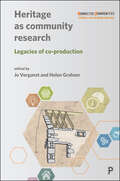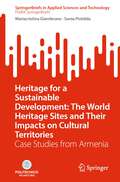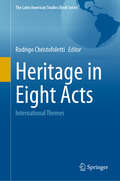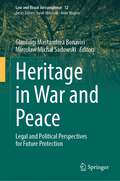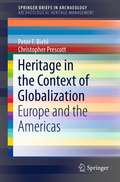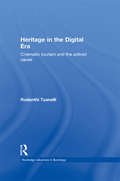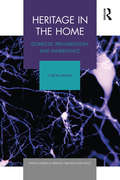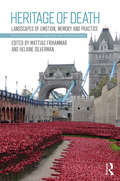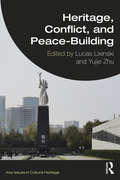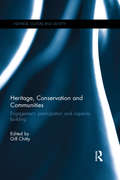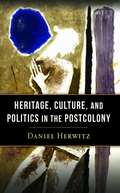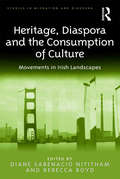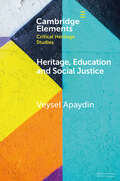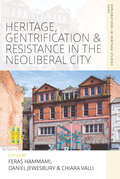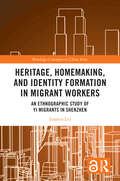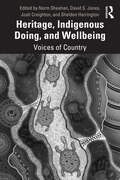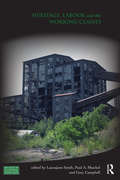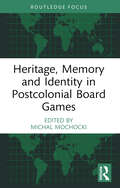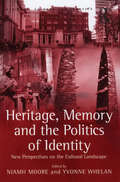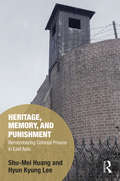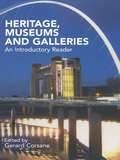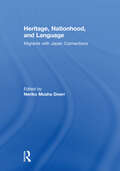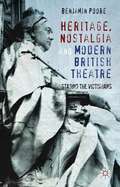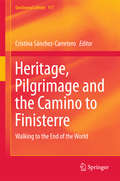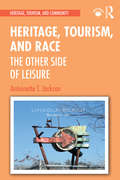- Table View
- List View
Heritage as Community Research: Legacies of Co-production (Connected Communities)
by Helen Graham and Jo VergunstHeritage as Community Research explores the nature of contemporary heritage research involving university and community partners. Putting forward a new view of heritage as a process of research and involvement with the past, undertaken with or by the communities for whom it is relevant, the book uses a diverse range of case studies, with many chapters co-written between academics and community partners. Through this extensive work, the Editors show that the process of research itself can be an empowering force by which communities stake a claim in the places they live.
Heritage for a Sustainable Development: Case Studies from Armenia (SpringerBriefs in Applied Sciences and Technology)
by Mariacristina Giambruno Sonia PistiddaThis book explores the potential contribution of cultural heritage in the enhancement of the territories, investigating the possibilities but also the criticalities involved in the process. Based on the knowledge process built on the Monasteries of Haghpat, Sanahin, Geghard and moreover, in the Upper Azat Valley in Armenia, the work suggests the development of an integrated design approach with interdisciplinary focus. The conservation of the Architectural Heritage of these sites is a priority for the identity safeguard but also to start virtuous processes able to ensure a sustainable development for places and communities. The objective of this work is the setting of pilot strategies and guidelines for the preservation and promotion of cultural heritage as an engine for a compatible and sustainable tourism development of the area, with tangible impact on social and economic development of the country. The work would benefit local authorities and communities, as well as researchers involved in these topics.
Heritage in Eight Acts: International Themes (The Latin American Studies Book Series)
by Rodrigo ChristofolettiHeritage in Eight Acts brings together contributions on cultural heritage at an international level with an emphasis on Latin American and Ibero-American studies, addressing points of convergence between the local and the global in an accessible and direct way. It discusses themes that have gained importance on the heritage preservation agenda, signaling how Latin America and Europe have expanded their connections and actions in favor of the multiplicity of heritage. Eight scholars from diverse backgrounds bring critical and nuanced understandings of heritage to the context of international relations. From architecture to history and from archeology to art history, each contribution displays methodological creativity and analytical depth. The result is a synthesis with the impact of showing how points of connection can bring Latin America closer to Europe, but not from a relationship of subalternity, but of shared protagonism.
Heritage in War and Peace: Legal and Political Perspectives for Future Protection (Law and Visual Jurisprudence #12)
by Mirosław Michał Sadowski Gianluigi Mastandrea BonaviriThis edited collection, which brings together nearly fifty authors from across the globe and various disciplines, makes a valuable contribution to the field of conservation, covering a wide range of topics regarding the protection of heritage in times of war and peace. Uniquely linking the two typically separate perspectives, the book builds on the wealth of discussions that took place during the 2021 and 2022 installments of the international “Heritage in War and Peace” Seminars held in Rome and Montréal, respectively.Issues explored in the volume include but are not limited to questions surrounding the protection of contentious heritages, unsustainability of the current dichotomic cultural/natural heritage protection frameworks, digitalization of heritage, place of heritage in military conflicts, use of heritage by armed non-state actors, indigenous peoples’ relationships with heritage, the intersection of intellectual property (IP) law and heritage, human rights matters linked to heritage protection, and the latest case studies surrounding restitution.Given its scope, the book will be of particular interest not only to practitioners and conservation specialists but also to academics and students in the broader social sciences and humanities, and to all those who hope to preserve our heritage for future generations.
Heritage in the Context of Globalization
by Christopher Prescott Peter F. BiehlThis brief is the proceedings of two roundtables and forums organized by Eszter Bánffy, Peter Biehl, Douglas Comer, and Christopher Prescott and sponsored by the European Association of Archaeologists (EAA) and the Society for American Archaeology (SAA) held at the 76th SAA annual conference in Sacramento in April 2011, and the 17th EAA annual conference in Oslo in September 2011. The book is organized around five main issues with the goal to stimulate discussion, research and practices within the field: Traditions and legal regulations of heritage and its management The teaching of cultural heritage; public outreach and university training Heritage and national identity The future of cultural heritage in a globalized and digitized world This book is thus be an exploration of the various experiences in Europe and the Americas to better understand, in the vast field of archaeology and cultural heritage management, where we are today, where we might be, and where we hope to be in the near future.
Heritage in the Digital Era: Cinematic Tourism and the Activist Cause (Routledge Advances in Sociology)
by Rodanthi TzanelliWhat happens to traditional conceptions of heritage in the era of fluid media spaces? ‘Heritage’ usually involves intergenerational transmission of ideas, customs, ancestral lands, and artefacts, and so serves to reproduce national communities over time. However, media industries have the power to transform national lands and histories into generic landscapes and ideas through digital reproductions or modifications, prompting renegotiations of belonging in new ways. Contemporary media allow digital environments to function as transnational classrooms, creating virtual spaces of debate for people with access to televised, cinematic and Internet ideas and networks. This book examines a range of popular cinematic interventions that are reshaping national and global heritage, across Europe, Asia, the Americas and Australasia. It examines collaborative or adversarial articulations of such enterprise (by artists, directors, producers but also local, national and transnational communities) that blend activism with commodification, presenting new cultural industries as fluid but significant agents in the production of new public spheres. Heritage in the Digital Era will appeal to students and scholars of sociology, film studies, tourist studies, globalization theory, social theory, social movements, human/cultural geography, and cultural studies.
Heritage in the Home: Domestic Prehabitation and Inheritance (Critical Studies in Heritage, Emotion and Affect)
by Caron LipmanThis book explores how people encounter the pasts of their homes, offering insights into the affective, emotional and embodied geographies of domestic heritage. For many people, the intimacy of dwelling is tempered by levels of awareness that their home has been previously occupied by other people whose traces remain in the objects, décor, spaces, stories, memories and atmospheres they leave behind. This book frames home as a site of historical encounter, knowledge and imagination, exploring how different forms of domestic ‘inheritance’ – material, felt, imagined, known – inform or challenge people’s homemaking practices and feelings of belonging, and how the meanings and experiences of domestic space and dwelling are shaped by residents’ awareness of their home’s history. The domestic home becomes an important site for heritage work, an intimate space of memories and histories – both our own but also not our own – a place of real and imagined encounters with a range of selves and others. This book will be of interest to academics, students and professionals in the fields of heritage studies, cultural geography, contemporary archaeology, public history, museum studies, sociology and anthropology.
Heritage of Death: Landscapes of Emotion, Memory and Practice (Routledge Cultural Heritage and Tourism Series)
by Helaine Silverman Mattias FrihammarToday, death is being reconceptualised around the world as heritage, replete with material markers and intangible performances. These heritages of death are personal, national and international. They are vernacular as well as official, sanctioned as well as alternative. This book brings together more than twenty international scholars to consider the heritage of death from spatial, political, religious, economic, cultural, aesthetic and emotive aspects. It showcases different attitudes and phases of death and their relationship to heritage through ethnographically informed case studies to illustrate both general patterns and local and national variations. Through analyses of material expressions and social practices of grief, mourning and remembrance, this book shows not only what death means in contemporary societies, but also how individuals, groups and nations act towards death.
Heritage, Conflict, and Peace-Building (ISSN)
by Lucas Lixinski Yujie ZhuHeritage, Conflict, and Peace-Building examines the possibilities arising from, and challenges associated with, transforming heritage from a casualty of conflict into an opportunity for peacebuilding.The contributors to this book, who hail from academia and practice, present case studies that shed light on the multifaceted factors and conditions influenced by diplomacy, nationalism, victimhood, and the roles of diverse institutional actors in fostering peace. They demonstrate the possibilities and pitfalls of the work heritage does for local communities, the nation-state, and the international community, when these different actors and their peace aspirations and agendas intersect. Looking at heritage and peace processes on all continents, the contributions in this volume amount to a compelling analytical account of how the discourses of heritage and peace connect, overlap, and diverge. They also emphasise that our shared aspiration for peace should not be taken for granted in a heritage context, and that it is incumbent upon heritage scholars and practitioners to be more intentional about the work they wish to do to promote peace.Heritage, Conflict, and Peace-Building will be of interest to scholars and practitioners working in heritage studies, transitional justice, museum studies, international relations, education, history, and law.
Heritage, Conservation and Communities: Engagement, participation and capacity building (Heritage, Culture and Identity)
by Gill ChittyPublic participation and local community involvement have taken centre stage in heritage practice in recent decades. In contrast with this established position in wider heritage work, public engagement with conservation practice is less well developed. The focus here is on conservation as the practical care of material cultural heritage, with all its associated significance for local people. How can we be more successful in building capacity for local ownership and leadership of heritage conservation projects, as well as improving participative involvement in decisions and in practice? This book presents current research and practice in community-led conservation. It illustrates that outcomes of locally-led, active participation show demonstrable social, educational and personal benefits for participants. Bringing together UK and international case studies, the book combines analysis of theoretical and applied approaches, exploring the lived experiences of conservation projects in and with different communities. Responding to the need for deeper understanding of the outcomes of heritage conservation, it examines the engagement of local people and communities beyond the expert and specialist domain. Highlighting the advances in this important aspect of contemporary heritage practice, this book is a key resource for practitioners in heritage studies, conservation and heritage management. It is also relevant for the practising professional, student or university researcher in an emerging field that overarches professional and academic practice.
Heritage, Culture, and Politics in the Postcolony
by Daniel HerwitzThe act of remaking one's history into a heritage, a conscientiously crafted narrative placed over the past, is a thriving industry in almost every postcolonial culture. This is surprising, given the tainted role of heritage in so much of colonialism's history. Yet the postcolonial state, like its European predecessor of the eighteenth and nineteenth centuries, deploys heritage institutions and instruments, museums, courts of law, and universities to empower itself with unity, longevity, exaltation of value, origin, and destiny. Bringing the eye of a philosopher, the pen of an essayist, and the experience of a public intellectual to the study of heritage, Daniel Herwitz reveals the febrile pitch at which heritage is staked. In this absorbing book, he travels to South Africa and unpacks its controversial and robust confrontations with the colonial and apartheid past. He visits India and reads in its modern art the gesture of a newly minted heritage idealizing the precolonial world as the source of Indian modernity. He traverses the United States and finds in its heritage of incessant invention, small town exceptionalism, and settler destiny a key to contemporary American media-driven politics. Showing how destabilizing, ambivalent, and potentially dangerous heritage is as a producer of contemporary social, aesthetic, and political realities, Herwitz captures its perfect embodiment of the struggle to seize culture and society at moments of profound social change.
Heritage, Diaspora and the Consumption of Culture: Movements in Irish Landscapes (Studies in Migration and Diaspora)
by Diane Sabenacio Nititham Rebecca BoydUsing an interdisciplinary and transhistorical framework this book examines the cultural, material, and symbolic articulations of Irish migration relationships from the medieval period through to the contemporary post-Celtic Tiger era. With attention to people’s different uses of social space, relationships with and memories of the landscape, as well as their symbolic expressions of diasporic identity, Heritage, Diaspora and the Consumption of Culture examines the different forms of diaspora over time and contributes to contemporary debates on home, foreignness, globalization and consumption. By examining various movements of people into and out of Ireland, the book explores how expressions of cultural capital and symbolic power have changed over time in the Irish collective imagination, shedding light on the ways in which Ireland is represented and Irish culture consumed and materialized overseas. Arranged around the themes of home and location, identity and material culture, and global culture and consumption, this collection brings together the work of scholars from the UK, Ireland, Europe, the US and Canada, to explore the ways in which the processes of movement affect the people’s negotiation and contestation of concepts of identity, the local and the global. As such, it will appeal to scholars working in fields such as sociology, politics, cultural studies, history and archaeology, with interests in migration, gender studies, diasporic identities, heritage and material culture.
Heritage, Education and Social Justice (Elements in Critical Heritage Studies)
by Veysel ApaydinThis research examines how museums and heritage sites can embrace a social justice approach to tackle inequalities and how they can empower disadvantaged groups to take an equal benefit from cultural resources. This Element argues that heritage institutions can use their collections of material culture more effectively to respond to social issues, and examines how they can promote equal access to resources for all people, regardless of their backgrounds. This research examines heritage and museum practices, ranging from critical and democratic approaches to authoritarian practices to expose the pitfalls and potentials therein. By analysing case studies, examining institutions' current efforts and suggesting opportunities for further development with regard to social justice, this Element argues that heritage sites and museums have great potential to tackle social issues and to create a platform for the equal redistribution of cultural resources, the recognition of diversities and the representation of diverse voices.
Heritage, Gentrification and Resistance in the Neoliberal City (Explorations in Heritage Studies #5)
by Chiara Valli Feras Hammami, Daniel JewesburyWhat happens when versions of the past become silenced, suppressed, or privileged due to urban restructuring? In what ways are the interpretations and performances of ‘the past’ linked to urban gentrification, marginalization, displacement, and social responses? Authors explore a variety of attempts to interrupt and interrogate urban restructuring, and to imagine alternative forms of urban organization, produced by diverse coalitions of resisting groups and individuals. Armed with historical narratives, oral histories, objects, physical built environment, memorials, and intangible aspects of heritage that include traditions, local knowledge and experiences, memories, authors challenge the ‘devaluation’ of their neighborhoods in official heritage and development narratives.
Heritage, Homemaking, and Identity Formation in Migrant Workers: An Ethnographic Study of Yi Migrants in Shenzhen (Routledge Contemporary China Series)
by Junmin LiuLiu explores the experiences of Yi migrant workers in Shenzhen, China, investigating how their cultural heritage influences their search for identity and a sense of belonging. This book uncovers the intricate relationship between heritage and homemaking, examining how Yi migrants engage in their cultural practices within various settings such as families, workplaces, restaurants, tourist sites, and social media platforms.Through thorough fieldwork and interviews, the book demonstrates how ethnic heritage acts as a means for migrants to establish a feeling of connection during their migration journeys. Nevertheless, challenges and tensions emerge in the realm of home, illustrating the dynamic interplay between heritage and the construction of a sense of place. It also enriches our comprehension of the link between cultural heritage and the experiences of migrants, shedding light on the complexities of identity development in a globalised world.A valuable resource for scholars and researchers in disciplines like anthropology, migration studies, cultural studies, and Chinese studies, as well as professionals and policymakers interested in migrant integration, cultural heritage preservation, and urban development.
Heritage, Indigenous Doing, and Wellbeing: Voices of Country
by David S. Jones Norm Sheehan Josh Creighton Sheldon HarringtonHeritage, Indigenous Doing and Wellbeing presents an Australian Aboriginal relational understanding of the world that offers a counter-narrative to the Western notion of heritage towards new insights into the potential for sustaining the complex systems that support all life. From an Indigenous Australian perspective, the Western concept of heritage is intentionally exclusionary and supports social, political, economic and environmental injustice. Aboriginal people engage with Australia’s lands, waters, and skies every day in entirely different ways, seeing their Country as a living ‘heritage’, but in a unique relationship that engages the individual with Place, Ancestors, Language, and wellbeing analogous to a familial relationship. However, Country is most often relegated by heritage proponents to ‘intangible heritage’ resulting in the concept having little legislative, legal or administrative weight. Drawing on a common understanding of Country as sacred, living and sentient, rather than as objectified property or resource, the contributors to this book explore a diversity of relationships with Country that demonstrate the richness and the practical utility of this relational understanding. Heritage, Indigenous Doing and Wellbeing foregrounds the voices of Australian Aboriginal Peoples who are involved in ‘Caring for Country’. The book offers an essential resource for those engaged in the study of Country, heritage, museums, Indigenous Peoples, First Nations Peoples, landscape architecture, environmental studies, planning, anthropology and archaeology. It will also be of great interest to heritage practitioners working around the globe.
Heritage, Labour and the Working Classes (Key Issues in Cultural Heritage)
by Gary Campbell Paul A. Shackel Laurajane SmithHeritage, Labour and the Working Classes is both a celebration and commemoration of working class culture. It contains sometimes inspiring accounts of working class communities and people telling their own stories, and weaves together examples of tangible and intangible heritage, place, history, memory, music and literature. Rather than being framed in a 'social inclusion' framework, which sees working class culture as a deficit, this book addresses the question "What is labour and working class heritage, how does it differ or stand in opposition to dominant ways of understanding heritage and history, and in what ways is it used as a contemporary resource?" It also explores how heritage is used in working class communities and by labour organizations, and considers what meanings and significance this heritage may have, while also identifying how and why communities and their heritage have been excluded. Drawing on new scholarship in heritage studies, social memory, the public history of labour, and new working class studies, this volume highlights the heritage of working people, communities and organizations. Contributions are drawn from a number of Western countries including the USA, UK, Spain, Sweden, Australia and New Zealand, and from a range of disciplines including heritage and museum studies, history, sociology, politics, archaeology and anthropology. Heritage, Labour and the Working Classes represents an innovative and useful resource for heritage and museum practitioners, students and academics concerned with understanding community heritage and the debate on social inclusion/exclusion. It offers new ways of understanding heritage, its values and consequences, and presents a challenge to dominant and traditional frameworks for understanding and identifying heritage and heritage making.
Heritage, Memory and Identity in Postcolonial Board Games
by Michal MochockiHeritage, Memory and Identity in Postcolonial Board Games is a unique edited collection that explores the interplay of heritage, memory, identity and history within postcolonial board games and their surrounding paratexts. It also examines critiques of these games within the gamer communities and beyond. Drawing on a range of international contributions, examples and case studies, this book shows how colonialism-themed games work as representations of the past that are influenced by existing heritage narratives and discourses. It also considers the implications of using colonial histories in games and its impact on its audience, the games’ players. Heritage, Memory and Identity in Postcolonial Board Games will be relevant to scholars and postgraduate students in the fields of game studies, game design or development, heritage studies, postcolonial criticism, media studies, and history. It will also be beneficial to practicing game developers.
Heritage, Memory and the Politics of Identity: New Perspectives on the Cultural Landscape (Heritage, Culture and Identity)
by Yvonne WhelanThe study of the cultural landscape has gained momentum in recent years, revealing new insights to geographers, archaeologists, sociologists and architects. The cultural landscape is often viewed as an emblematic site and thus a key player in the heritage process. This book explores the overlapping and often complex relationships between identity, memory, heritage and the cultural landscape. It provides an overview of new approaches in the study of these relationships, combined with evidence from Ireland, England, Scotland and the United States. These case studies demonstrate the significance of the past in the contemporary construction of identity narratives and draw attention to the powerful role of monuments and parades as sites of cultural heritage. The focus then shifts to the way in which heritage has become politicized for various ends, demonstrating the changing perception of particular heritage sites and buildings, and the role that this has played in constructing and reconstructing particular identities.
Heritage, Memory, and Punishment: Remembering Colonial Prisons in East Asia (Memory Studies: Global Constellations)
by Shu-Mei Huang Hyun-Kyung LeeBased on a transnational study of decommissioned, postcolonial prisons in Taiwan (Taipei and Chiayi), South Korea (Seoul), and China (Lushun), this book offers a critical reading of prisons as a particular colonial product, the current restoration of which as national heritage is closely related to the evolving conceptualization of punishment. Focusing on the colonial prisons built by the Japanese Empire in the first half of the twentieth century, it illuminates how punishment has been considered a subject of modernization, while the contemporary use of prisons as heritage tends to reduce the process of colonial modernity to oppression and atrocity – thus constituting a heritage of shame and death, which postcolonial societies blame upon the former colonizers. A study of how the remembering of punishment and imprisonment reflects the attempts of postcolonial cities to re-articulate an understanding of the present by correcting the past, Heritage, Memory, and Punishment examines how prisons were designed, built, partially demolished, preserved, and redeveloped across political regimes, demonstrating the ways in which the selective use of prisons as heritage, reframed through nationalism, leaves marks on urban contexts that remain long after the prisons themselves are decommissioned. As such, it will appeal to scholars of sociology, geography, the built environment, and heritage with interests in memory studies and dark tourism.
Heritage, Museums and Galleries: An Introductory Reader
by Gerard CorsaneBringing the reader the very best of modern scholarship from the heritage community, this comprehensive reader outlines and explains the many diverse issues that have been identified and brought to the fore in the field of heritage, museums and galleries over the past couple of decades. The volume is divided into four parts: presents overviews and useful starting points for critical reflection focuses more specifically on selected issues of significance, looking particularly at the museum's role and responsibilities in the postmodern and postcolonial world concentrates on issues related to cultural heritage and tourism dedicated to public participation in heritage, museum and gallery processes and activities. The book provides an ideal starting point for those coming to the study of museums and galleries for the first time.
Heritage, Nationhood, and Language: Migrants with Connections to Japan
by Neriko Musha DoerrThe notion of "heritage" has become one of the global tropes in recent years. At the heart of heritage politics are three questions: what heritage is, who decides what it is, and for whom is the decision made. However, existing work on heritage language has rarely tackled these questions, assuming that teaching children of migrants their "heritage language" empowers them.This book challenges this assumption, situating the notion of heritage language in the host society’s involvement in social justice, nation-building efforts, (superficial) celebration of diversity, and investment on global links the migrants offer as well as the migrants’ fear of discrimination and desire for belonging, social status, and economic gain. Based on ethnographic research in Bolivia, Peru, the United States, and Japan, the book illuminates the complexity and political nature of determining what constitutes heritage language for migrants with connections to Japan. This volume opens up a new field of investigation in heritage language studies: the complex linkage between heritage language and social justice for migrants.This book was published as a special issue of Critical Asian Studies.
Heritage, Nostalgia and Modern British Theatre
by Benjamin PooreThe Victorians, having once been seen as 'them', the age responsible for the mistakes of the past, were transformed by the new theatrical forms of the 1960s into 'us', a metaphor for what the nation thinks (and fears) about itself. And, since the 1980s and the rise of new biographical forms in the theatre, the emphasis has shifted further, from 'we' to 'me': plays about individuals, great and small, and their struggles for personal validation. This study argues powerfully that the stage portrayal of the Victorians in recent times is a key reference point in understanding notions of Britishness, heritage and nostalgia, and the profound politicisation of national identity over the last four decades. Using many examples drawn from theatre archives, and throwing new light on works by canonical playwrights like Bond, Edgar, and Churchill, it charts the decline in class-based narratives of the British people and the move towards plays reflecting a more atomised, individuated society, preoccupied with identity and the past but no longer able to provide a convincing account of itself as a nation.
Heritage, Pilgrimage and the Camino to Finisterre
by Cristina Sánchez-CarreteroThis book presents research concerning the effects of the Camino to Finisterre on the daily lives of the populations who live along the route, and the heritagization processes that exploitation of the Camino for tourism purposes involves. Rather than focusing on the route to Santiago de Compostela and the pilgrimage itself, it instead examines a peculiar part of the route, the Camino to Finisterre, employing multiple perspectives that consider the processes of heritagization, the effects of the pilgrimage on local communities, and the motivations of the pilgrims. The book is based on a three-year research project and is the result of a multidisciplinary collaboration between anthropologists, sociologists, historians and archaeologists. Instead of ending in Santiago, as the rest of the Caminos do, this route continues to the cape of Finisterre on the Galician Atlantic coast. This part of the Camino de Santiago is not officially recognized by the Catholic Church and does not count as part of reaching Compostela, the recognition granted by the Catholic Church to those pilgrims who have walked at least 100 km. For this reason, as well as its relationship with the sun cult, many pilgrims call this route "the Camino of the atheists. " In fact, the Catholic Church is a strong force for the heritagization of the rest of the Caminos, and maintains a clear ignoratio strategy concerning the Finisterre route: Officially, the church neither opposes nor recognizes this route.
Heritage, Tourism, and Race: The Other Side of Leisure (Heritage, Tourism, and Community)
by Antoinette T JacksonHeritage, Tourism, and Race views heritage and leisure tourism in the Americas through the lens of race, and is especially concerned with redressing gaps in recognizing and critically accounting for African Americans as an underrepresented community in leisure. Fostering critical public discussions about heritage, travel, tourism, leisure, and race, Jackson addresses the underrepresentation of African American leisure experiences and links Black experiences in this area to discussions of race, place, spatial imaginaries, and issues of segregation and social control explored in the fields of geography, architecture, and the law. Most importantly, the book emphasizes the importance of shifting public dialogue from a singular focus on those groups who are disadvantaged within a system of racial hierarchy, to those actors and institutions exerting power over racialized others through practices of exclusion. Heritage, Tourism, and Race will be invaluable reading for academics and students engaged in the study of museums, as well as architecture, anthropology, public history, and a range of other disciplines. It will also be of interest to museum and heritage professionals and those studying the construction and control of space and how this affects and reveals the narratives of marginalized communities.
